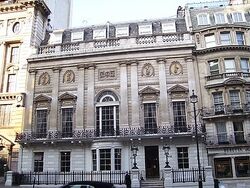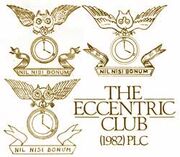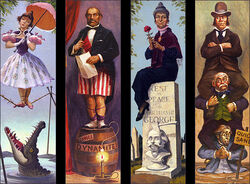| The Eccentric Club | |
|---|---|
 40 Dover Street | |
|
Founding |
1781 |
|
Membership |
Eccentrics, Philanthropists and Changelings |
|
Location |
40 Dover Street |
|
Club motto |
Nil Nisi Bonum |
|
President |
Sir Roderick Basset |
The Eccentric Club is a London Gentleman's Club formerly known in its various incarnations as The Illustrious Society of Eccentrics, The Everlasting Society of Eccentrics, The Eccentric's Society Club and, finally, Those People (this last name being used primarily by members of other London-based gentleman's clubs). For more than two centuries the Eccentric Club has been one of the most important institutions of Imperial society.
History[]
"Look at that eccentric wheel in that steam engine, what motion would you get out of it without that wheel's eccentricity - only rest. So in society you would get precious little driving force out of it, but for eccentricities having free and active motion. Let us encourage them, let us utilize them!" (Extract of the opening speech by its first president, 1781).
Founded in 1781 by a group of welthy aristocrats looking to take advantage of new ideas in the Industrial revolution, The Eccentric's Society made its name for bringing together men with grand ideas and men with grand bank accounts. The Society was a steam-powered engine of progress delving into any idea or theory despite social taboos.
The Society was also well-known for charitable events, donating thousands of pounds to the needy in Scotland, Ireland and Wales. It is believed that these activities were what first brought the Society to the attention of the Empire. While the exact details were lost in The Blitz, it is still understood that the first changeling member of the society was a female changling social worker, looking for recently escaped changelings. When she contacted the society they asked her to become a member, shocking at the time.
Between 1858-1860 the Society changed it's name to The Eccentric Club, and due to it's changeling members found itself inundated with aspiring writers, artists, gentlemen of the creative persuasion and businessmen interested in the arts. While the club records recall actors and artists arriving at the club after performances in bizzare costumes and make up, sometimes still bearing fake blood and wounds from battle scenes and murder mysteries, the clever Imperial citizen can read between the lines.
As the Club was growing, many mortal members were staying till late and nicknamed the new members ‘the night owls’ which gave the Club its mascot and sacred symbol: to this day in the the club's main bar (known as The Owl's Roost) there is an illuminated panorama of stuffed owls and a wooden owl upon a backwards running clock.
The most famous stuffed owl is kept in the Club library, under a glass dome holding in its beak a fob watch showing the witching hour of four o'clock, or, as some had seen it, 12 and 4 o'clock - the busiest hours of the Club's nightlife.

During the First World War, members of the Eccentric were entertaining the troops on the frontline, regardless if they wanted entertainment or not. By auctioning off things they found in the Club's couches they raised over £25,000 for limbless soldiers, regularly visited wounded soldiers in the hospitals and distributed amongst them food, tobacco, cigarettes and pipes. About the same time, numerous hospitals, hostels and orphanages were built by the Club. All of these events were "piggybacked" by the Empire, allowing them a foothold in every area the Club worked in.
During the Second World War, a further £50,000 were raised to support the victory and many of the Club's members were fighting on the frontline, while back at home, the Club premises in Dover Street were seriously damaged by the enemy bombs, and a large part of the Club's original archive and library burnt down. This event coincided with the destruction of the Original Imperial Palace (leading some modern Imperials to wonder if the doorway to the palace wasn't hidden inside the original library).
As the Empire rebuilt into it's third incarceration, the club rebuilt and expanded its premisis, allowing for more members. The Third Empire has made the Eccentric Club the informal seat of the new empire, cementing its long standing position in Imperial life.
Importance[]
As the main tenant of the club is the toleration, nay, the expectation of strange behavior and odd ways of looking at the world, it allows returned Lost to mingle freely with mortal members without risking exposure of there true nature or ostracization.
Indeed, this habit of tolerating any strange activity has allowed the Empire to shift almost all of its administrative and courtly functions to the Club. The process of taxation, formal inquiries/investigations and communication is all carried out under the noses of the far-larger mortal membership of the club.
Sir Roderick Basset, the Club's mundane president, is particularly vital as his personal funds subsidize a great many imperial activities.
Motto[]
“Nil Nisi Bonum” (“Nothing but good”) – a shortened version of the Latin phrase “de mortuis nil nisi bonum dicendum est” (“Say nothing of the dead, but good”). ‘Nothing but good’ became is a core principle of members’ conduct.
Notable Members and Staff[]

From left to right- Margret Todd-Herne, Sir Roderick Basset, Constance George, William Cavendish-Scott-Bentinck and associates
- Sir Roderick Basset, President (Mundy)
- Irene Travers, Secretary to the President
- Imperial of the Spring Court Fairest/Flamesiren
- Reginald "Moneypenny" Priceock, Desk Attendant (Mundy)
- Toliver Burberry, Business Manager (Mundy)
- Jefferies, Head Valet (Mundy)
- Margret Todd-Herne, Member (Mundy)
- Constance George
- Lord William Cavendish-Scott-Bentinck VII, Member (Mundy)